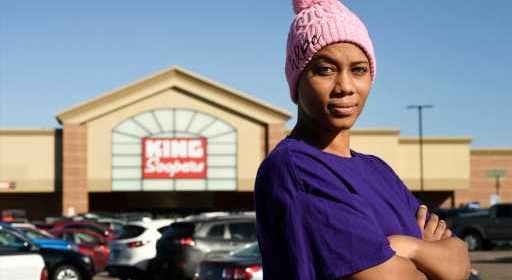Colorado grocery workers worry as Thanksgiving shoppers crowd stores

This is one of the busiest weeks of the year for grocery stores, and workers in those stores are worried.
They’re worried that the aisles are too crowded, and that too few people wear masks. They’re worried about how many of their colleagues are calling out sick, and about all the extra hours others have to pick up as a result. They’re worried about covering bills, and wondering why the companies that employ them suspended $2-per-hour “hero pay” bonuses in the spring, even though COVID-19 has never been more prevalent in Colorado.
And, perhaps above all, they’re worried about catching the virus.
That fear is far too real for King Soopers employees in Denver’s Capitol Hill neighborhood, which saw two workers, Randy Narvaez and James McKay, die of COVID-19 earlier this year.
Robert Mann, a 39-year employee who worked with both Narvaez and McKay, was hospitalized with the virus in the spring, and happened to be two ICU rooms down from McKay. From his vantage point at the hospital, he could see McKay leave in a body bag. He also texted with Narvaez, who was at a different hospital, “until one day I sent him a message and I didn’t get any response back.”
With stores packed with holiday shoppers and the virus spreading uncontrolled — 1 in every 41 people in Colorado was contagious with the virus, Gov. Jared Polis said Tuesday — Mann feels nervous to go to work.
“It does get super busy,” he said. “They don’t have a plan as far as I can tell. I’ve asked a few employees, even in management. Nobody seems to know what they’re going to do.”
In interviews with The Denver Post, spokespeople for King Soopers and Safeway described a slew of ways these corporations have sought to keep customers and staff safe, with constantly updating protocols designed to reflect the latest science and state public health orders. Nothing, they say, is more important than safety.
But it doesn’t feel that way to many workers.
Elisha Curtis, who works at Safeway in Montrose, said that mask-wearing in her store is “about 50/50.” She said maskless shoppers often claim to be unable to wear masks for medical reasons — an excuse that health professionals say is valid for only a sliver of the population.
But, said King Soopers spokeswoman Jessica Trowbridge, “with HIPAA, we’re pretty restricted in what we can do there.”
Curtis said she understands little can be done in that situation, but said the number of people who remain maskless despite the state mask mandate makes her feel “very frustrated, very upset.”
“They may not think that this COVID is real, but they’re putting us and our families at risk just making that decision on their own,” she said. “Really, you’re only in the store for maybe 30 minutes max. It doesn’t hurt anyone to put a mask on for that long.”
There are plenty of other safety measures that workers say are in their bosses’ control.
Several said that they have little confidence in their stores’ crowd-control strategies, and that they’d like to see stricter capacity limits.
“We’re sitting at a small square footage, and our customers number is around 250 in the store at one time,” Curtis said. “That’s really still too high.”
“Before we had it where there were times when elderly people could come in and shop apart from the rest of the population,” said Tairyce Bass, who works at King Soopers in Golden. “That’s something that’s not enforced as it was before.”
One of her sons has a respiratory condition that makes her extra motivated to not catch the virus. She tries to work shifts with relatively low foot traffic, and she has an elaborate routine when she comes home from work that involves gloves, hand-washing and constantly carrying a change of clothes in her car.
She said she enjoys the work but doesn’t feel safe.
“People like myself are constantly putting our families at risk by coming into work,” Bass said.
It was in recognition of the extraordinary circumstances under which people like Bass are working that Kroger — the company that owns King Soopers and City Market — and Safeway/Albertson’s offered employees $2 hourly bonuses during the spring. Despite rising profits — Kroger, for one, said in September that revenue rose 8.2% year over year to $30.5 billion — those programs ended long ago.
Members of the United Food and Commercial Workers union in Colorado and nationally are pressing these companies to bring back hazard pay.
“The numbers have gone up, and the risks are even higher. We’ve lost three of our union members to COVID-19. For parents like myself, you can’t work the hours you planned to work, because you’re now a teacher at home,” Bass said. “Going to work and having that extra $2 could make a world of difference. It would be helpful to everybody.”
Asked whether hazard pay could return, Trowbridge said, “I don’t have a comment to add on that at this point. We continue to evaluate ways we can reward and recognize our associates.” She said the company has spent more than $1 billion to date on coronavirus-related safety enhancements and employee bonuses.
Kris Staaf, spokeswoman for Safeway and Albertson’s in Colorado, said, “I appreciate there are concerns that are out there,” but added, “I just don’t want to speculate what we may or may not do.”
Kroger recently gave employees $100 gift cards to be used at its stores, plus 1,000 “fuel points” for Kroger gas stations. Safeway, the local union chapter said, provided $30 gift cards to be used at Safeway stores.
Neither bonus comes close to what workers were netting with hazard pay.
“We want our company just to do what’s right and realize that we are out there on the front lines,” Curtis said.
Join our Facebook group for the latest updates on coronavirus in Colorado.
Source: Read Full Article


